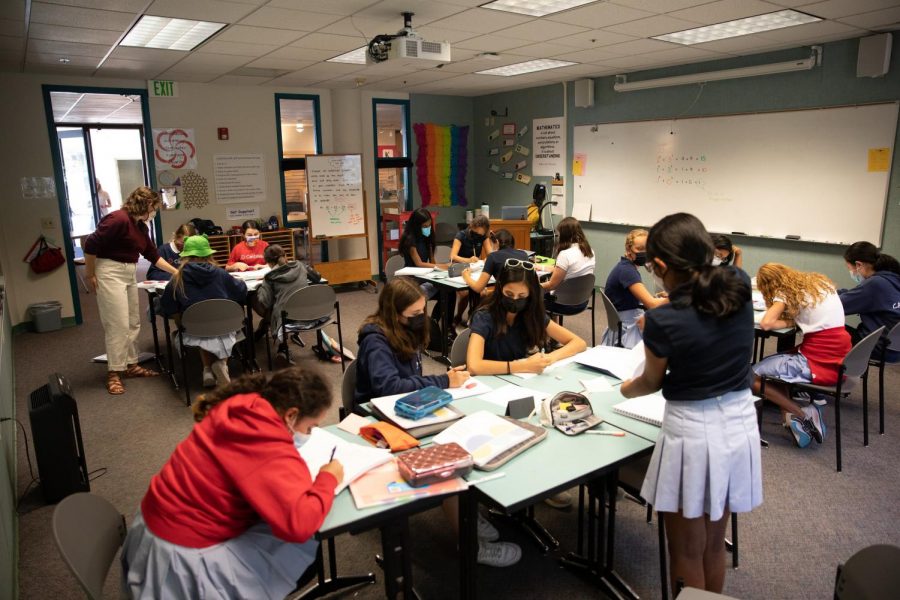Is collaborative work at school beneficial?
Middle school students work together in math class.
Most students have had a so-called “collaborative” work experience they can confidently recall as a complete disaster. Whether the issue is lack of communication, unequal contribution, scheduling conflicts, or all of the above, group work can be challenging. The stress of receiving grades based not only on your contribution, but also the work of other partners, only further adds to the pressure and conflict.
While speaking to Castilleja Upper Schoolers about their experiences in group projects, the common theme of annoyance is clear. Kayley Ko ‘25 expressed frustration towards group projects, saying, “It’s hard because a lot of the time it feels like you have to pick up the slack of the other people in your group when they’re not pulling their weight.” Another freshman, Sophie Profit, shared a similar sentiment, explaining that “group members aren’t always organized with the material, and while you don’t want to look rude, you also need to get the work done,” showing that not only communication issues, but also deadlines can create tension within groups.
Olivia Stinson ‘24 added that scheduling conflicts are an issue while working with partners: “It’s hard to coordinate with people, especially at Casti, because people have so many extracurriculars.” Stinson also faces the issue of understanding necessary concepts while working in a group, claiming that “it’s hard to actually learn the material in a group project because either you’re doing the entire project, and learning the material, or you are doing part of the project, and then only learning the part that you worked on.”
Overall, students agree that it can be challenging to manage understanding course material, communicating with partners, and making sure the work distribution is even. It is hard to see the benefits of group projects given the issues that group members face.
If group projects are so stressful and unfair, why are they assigned in the first place? When Castilleja teachers spoke about their perspective on group projects, they seemed to understand the challenges. When presented with examples of conflicts in group projects, Middle School English teacher Margaret Reges stated simply, “I get it.” She claimed that as a teacher “you’re always worried about group dynamics.” Teachers acknowledge the fact that problems arise when working with others and that it can make the process of working in a group really difficult.
Eighth grade history teacher Heather Pang explained that steps are taken to push groups towards success, emphasizing that “reminders that everybody should be pulling their weight are not random. They’re scheduled.” While teachers see that work distribution can be a burden and try to alleviate the struggle, teachers also see it as part of the learning process. Pang states that “group work generally teaches skills that students need. Negotiating with somebody about how the work is going to get done…these are things that you do in your life.”
Both Reges and Upper School Physics teacher Jon Rockman highlighted the importance of learning about teamwork through collaborative work. Rockman highlighted specifically that “science research is collaborative,” and therefore, teamwork is hugely important to work in STEM. Reges believes that collaboration is simply an essential skill in life that should be taught during the formative years of education. Although it is important to work through issues as a group, both Pang and Reges strongly encourage students to communicate with teachers about problems. Pang stated that “it is never inappropriate to involve a teacher.” As students, it is critical to not only try to communicate with each other, but also to include teachers.
Although group projects can feel upsetting and stressful as a student, key skills are developed through collaboration. Rather than being seen as terrible, group projects should really be seen as an opportunity to learn how to communicate with partners, to contribute equally, and to self-advocate by involving a teacher when necessary. Learning to handle issues that arise during collaboration is a foundational part of learning how to have productive teamwork and an integral tool for future success.

Natalie Goler '25 is a staff writer for Counterpoint. She enjoys playing tennis, winning board games, and jibbifying crocs.


